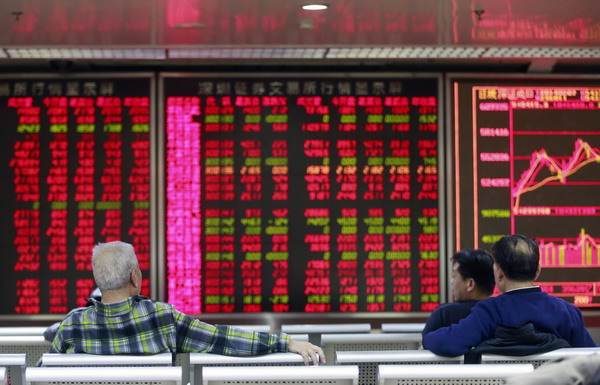Investors at a securities brokerage in Beijing, Feb?7, 2014.?Feng Yongbin / China Daily

Responsibility for analyzing issuers' finances poised to shift to investors
After the launch of Shanghai-Hong Kong Stock Connect, the next important development that investors are waiting for is a shelf registration system for share issues.
At present, the China Securities Regulatory Commission approves each initial public offering in the mainland markets. But by the end of this month, it will send a reform plan to the State Council for review.
The long-awaited reform will quickly face a test among investors, and it is unclear how they will react to this sweeping change.
The 25-person CSRC panel that reviews and approves IPO applications was set up in 2001. It is extremely powerful because it alone holds the keys to entering the A-share market.
But there is serious corruption in the process, and questions have swirled around the panel. For example, some financially weak companies have been allowed to issue shares ahead of better-qualified enterprises.
Investor skepticism intensified when commission member Deng Ruixiang was investigated for insider trading and corruption.
Will the IPO reform resolve these problems? The market is waiting for the draft plan to see.
As of Nov 30, more than 570 companies remained on the IPO waiting list. There is a huge list in part because approvals were suspended for more than a year to allow for reforms, including the one now under discussion.
The shelf registration system may rebalance stock supply and demand, and extremely high IPO valuations may disappear when the market can reflect the real value of listed companies, said Li Daxiao, chief economist at Yingda Securities Co Ltd.
"This big reform will lead to a mature Chinese stock market," he said.
The reform is a huge project, as the basis of the Securities Law must be modified. Other laws and regulations also need changes.
According to the CSRC, the entire reform process involves multiple agencies including the National Development and Reform Commission, the Ministry of Finance, and the central bank.
However, some experts said that the reforms will not end speculation involving new shares among Chinese investors. On the contrary, an anticipated surge in the number of new listings may spark what was famously called "irrational exuberance".
Examples can be seen even in mature markets, such as the frenzied reaction to Facebook Inc's Nasdaq debut, which had nothing to do with United States' securities regulations.
For investors in the Chinese capital market, the new system will mean more choices as more companies list in a shorter period.
But it is also a challenge. Investors will need to read each company's prospectus carefully and make their own analysis of listed companies' future profits, drawing on more transparent data.
For companies, simplification of the IPO procedure means a shorter waiting period.
Without the requirements for a record of profitability that now prevail, it will be much easier for them to raise funds in the capital market.
More shares in the market could also mean diluted valuations for each company if the pool of capital does not expand. And that could drive down the whole market.
